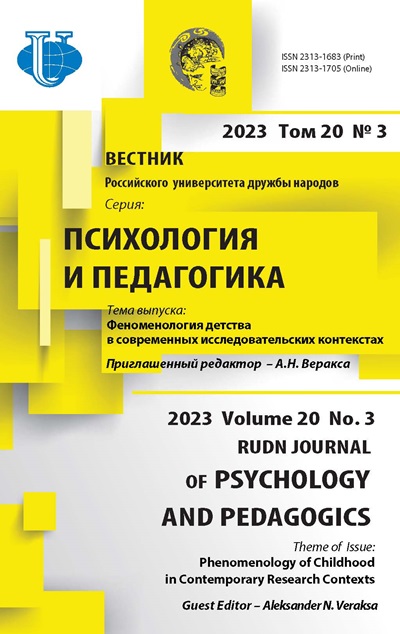Coping and Protective Behavior of Residents of Radioactive Contaminated Territories Depending on Age and Gender
- Authors: Borisova I.V1, Gulakova E.S1
-
Affiliations:
- Bryansk State Academician I.G. Petrovski University
- Issue: Vol 15, No 1 (2018)
- Pages: 79-93
- Section: PERSONALITY AND SOCIAL PSYCHOLOGY
- URL: https://journals.rudn.ru/psychology-pedagogics/article/view/18182
- DOI: https://doi.org/10.22363/2313-1683-2018-15-1-79-93
Cite item
Full Text
Abstract
The article examines the results of an empirical study of the coping and protective behavior of the residents of radioactive contaminated territories, depending on age and gender. The specifics of coping and protection are revealed depending on age and gender. It is shown that young men and women more often use non-constructive ways of coping behavior to cope with difficult life situations, in comparison with adult men and women. Men are worse than women at relieving stress and maintaining self-esteem in difficult life situations through the use of coping strategies. It was established that the residents of radioactive territories do not want to take responsibility for their lives, but passively expect assistance without any independent actions aimed at resolving their problems. It was revealed that substitution as a mechanism of psychological defense is more pronounced in adolescent and mature men than in girls and women, respectively. The relationship between defensive and coping behavior in adolescence and adulthood was described. It was established that in adolescence, confrontational coping, manifested through aggressive efforts aimed at actively asserting one’s opinion and desires in relations with others and trying to have one’s own way, through chaotic activities that do not change the situation, is closely related to the mechanisms of psychological defense. Substitution does not allow the use of constructive ways of coping both in adolescence and in adulthood. The results of the study can be used to provide psychological assistance to residents of radioactive contaminated areas.
About the authors
Irina V Borisova
Bryansk State Academician I.G. Petrovski University
Author for correspondence.
Email: Irmarbor1@yandex.ru
PhD in Psychology, Associate Professor of the Department of General and Professional Psychology
Bezhitskaya str., 14, Bryansk, Russia, 241036Elena S Gulakova
Bryansk State Academician I.G. Petrovski University
Email: lenokgulakova@yandex.ru
student
Bezhitskaya str., 14, Bryansk, Russia, 241036References
- Amirkhan, J.H. (1990). A factor analytically derived measure of coping: The Coping Strategy Indicator. Journal of Personality and Social Psychology, (4), 1066—1074.
- Billings, A.G., & Moos, R.H. (1984). Coping, stress, and social resources among audits with unipolar depression. Journal of Personality and Social Psychology, 46(4), 877—891.
- Borisova I.V., & Borisova U.N. (2017). Conducting Behavior Features among the Pensioners with Different Gender. International Journal of Advanced Biotechnology and Research, 8(3), 2340—2344.
- Borisova I.V., & Ermakova E.A. (2017). Protective and coping behavior of boys and girls from full and incomplete families. Voprosy psikhicheskogo zdorov’ya detei i podrostkov, 3(17), 87—92. (In Russ.).
- Folkman, S., & Lazarus, R.S. (1998). Coping as a mediator of emotion. Journal of Personal and Social Psychology, 54, 466—475.
- Frydenberg, E. (2004). Coping Competencies. Theory into Practice, 43(1), 14—22.
- Granovskaya, R.M., & Nikol’skaya, I.M. (2010). Psikhologicheskaya zashchita u detei. St. Petersburg: Rech’. 352 p. (In Russ.).
- Heim, E. (1988). Coping and psychosocial adaptation. Journal of Mental Health Counseling, 10, 136— 144.
- Khavylo, A. V. (2015). Sotsial’no-psikhologicheskie problemy zhiznedeyatel’nosti i stressovye reaktsii naseleniya radioaktivno zagryaznennykh territorii Rossii posle avarii na Chernobyl’skoi AES v otdalennom periode. PhD in Psychology Thesis. St. Petersburg, 16 p. (In Russ.).
- Kryukova, T.L., & Gushchina, T.V. (2015). Kul’tura, stress i koping: sotsiokul’turnaya kontekstualizatsiya issledovanii sovladayushchego povedeniya: monografiya. Kostroma: KGU im. N.A. Nekrasova, 236 p. (In Russ.).
- Maddi, S.R. (1999). The personality construct of hardiness: Effects on experiencing, coping, and strain. Consulting Psychology Journal: Practice and Research, 51(2), 83—94.
- Mel’nitskaya, T.B., Belykh, T.V. (2012). Features of coping behavior of the population living on radioactively contaminated territories of Russia Psikhologicheskie issledovaniya, 5(24), 11. URL: http://psystudy.ru (Accessed: 1 July 2017). (In Russ.).
- Molyako, V.A. (2016). Psychological consequences of the Chernobyl nuclear catastrophe. Razvitie lichnosti, (2), 32—52. (In Russ.).
- Mukhina, V.S. (1999). Vozmozhnost’ vozniknoveniya «kompleksa zhertvy» postradavshikh ot avarii na ChAES. In. V.S. Mukhina (Ed.). Fenomenologiya razvitiya i bytiya lichnosti: izbrannye psikhologicheskie trudy (pp. 523—527). Moskva-Voronezh: MPSI : MODEK Publ. (In Russ.).
- Nartova-Bochaver, S.K. (1997). “Coping behavior” in the system of concepts of the psychology of personality. Psikhologicheskii zhurnal, 18(50), 20—29. (In Russ.).
- Plutchik, R., Kellerman, H., & Conte, H.R. (1979). A structural theory of ego defenses and emotions. In C.E.Izard (Ed.), Emotions in personality and psychopathology (pp. 229—257). New York: Plenum Press.
- Romanova, E.S., & Grebennikov, L.R. (1996). Mekhanizmy psikhologicheskoi zashchity: genezis, funktsionirovanie, diagnostika. Mytishchi: Talant Publ. 144 p. (In Russ.).
- Rumyantseva, G.M., Margolina, V.Ya., Plyplina, D.V. et al. (1997) Perception of risks by the population living on contaminated areas due to the Chernobyl accident. Radiatsiya i risk, (10), 160—165. (In Russ.).
- Skinner, E.A., & Edge, K. (2002). Parenting, motivation, and the development of coping (pp. 77—143). Lincoln: University of Nebraska Press.
- Vasserman, L.I., Ababkov, V.A., & Trifonova, E.A. (2010). Sovladanie so stressom: teoriya i psikhodiagnostika. St. Petersburg: Rech’ Publ. 192 p.
- Weber, H. (2003). Breaking the rules: Personal and social responses to coping norm-violations. Anxiety, Stress and Coping: An International Journal, 16(2), 133—153.
- Yaltonskii, V.M., & Sirota, N.A. (2008). Psikhologiya sovladayushchego povedeniya: razvitie, dostizheniya, problemy, perspektivy. In A.L. Zhuravleva, T.L. Kryukovoi, E.A. Sergienko (Eds.), Sovladayushchee povedenie: sovremennoe sostoyanie i perspektivy (pp. 21—54). Moscow: Institut psikhologii RAN. (In Russ.).
















